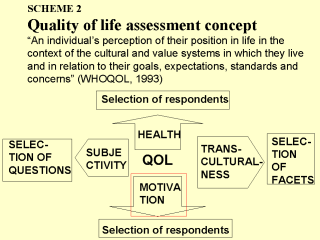 SUBJECTIVE
assessment of the totality of an individualís culturally conditioned and HEALTH-related
experiences that motivates their adaptive behaviour |
The upper part of
the scheme presents the explication of quality of life notion formulated by the WHO which
is often regarded as the definition of this notion, while the bottom part presents the
wording formulated by the Quality of Life Group of the V.M.Bekhterev Institute. The
graphical image of the notion (in the centre) presents its basic components that are the
organic parts of the given definitions as well as the functions of each element in the
process of scale development. The central part of the scheme presents the being defined
quality of life notion. To the left of it, ďsubjectivityĒ is presented that acts here
as a requirement to use not the objective descriptions of the respondentís life, but
his/her assessment of his/her life experience. This makes the instruments sensitive to
personality life assessment, not to the respondentís objective state of affairs. In
practical application the requirement of subjectivity means that of all the questions
potentially characterising the patientís life only those will be included in the scale
which measure particularly his/her experience, for instance, satisfaction, or the
frequency of indubitably positive events, or the degree of display of indubitably valued
abilities. Transculturalness (to the right of QOL) requires, on the one hand, to
select for assessment the facets that are common for different cultures, and, on the other
hand, to make them acceptable and understandable for each culture in particular. This
makes the instrument insensitive to cultural living conditions; at the same time the
instrument preserves its efficiency, which is necessary for comparative transcultural
studies. Health-relatedness requires selecting for investigations polar groups of well and
ill persons. We met all these requirements in the process of developing the WHOQOL-100
instrument. |
